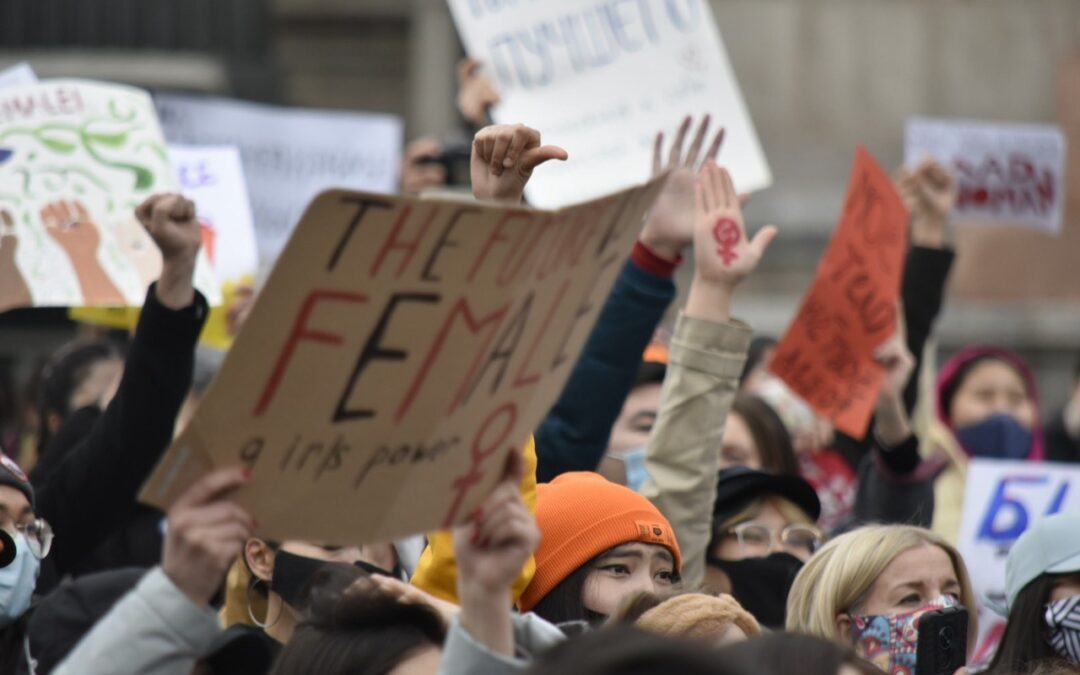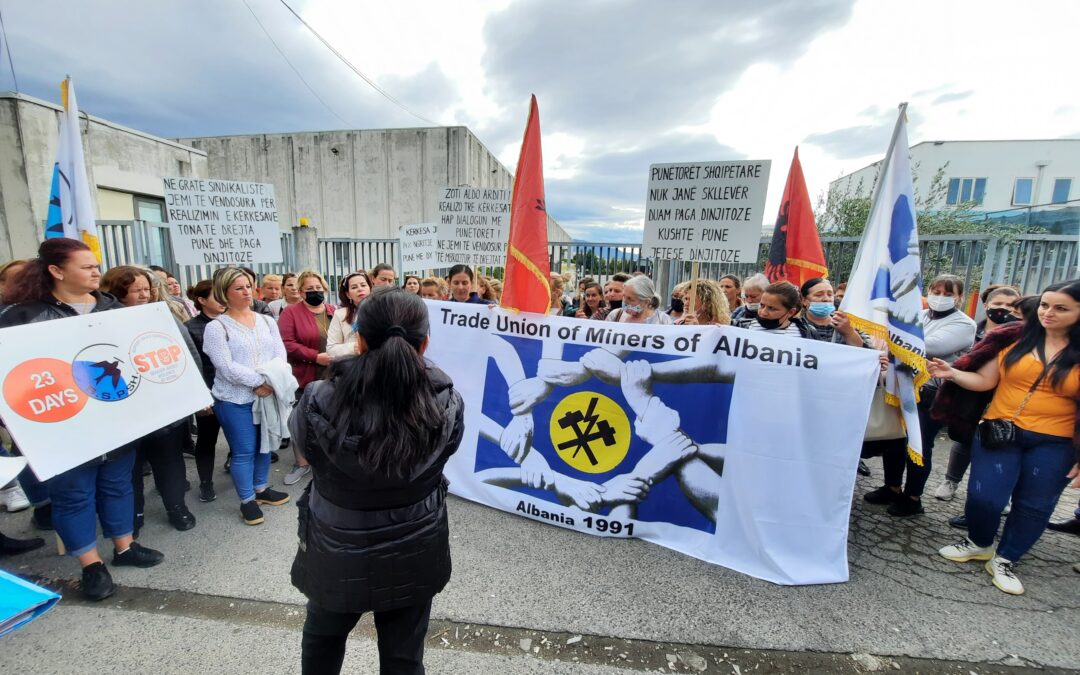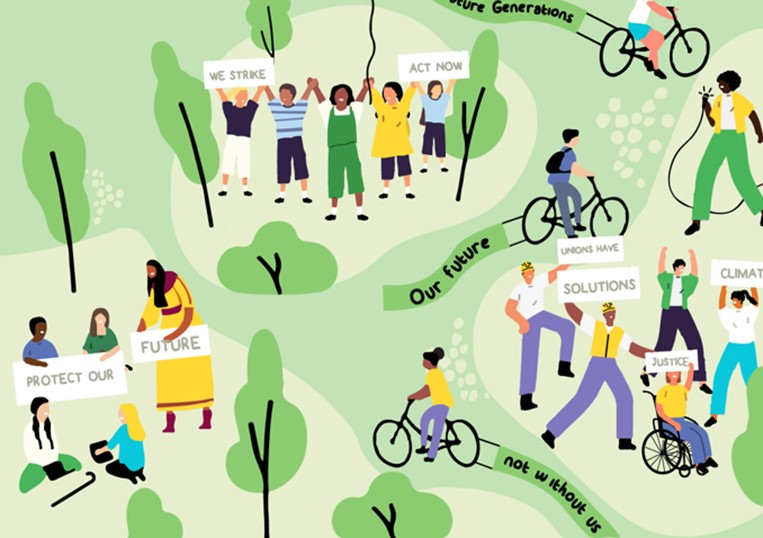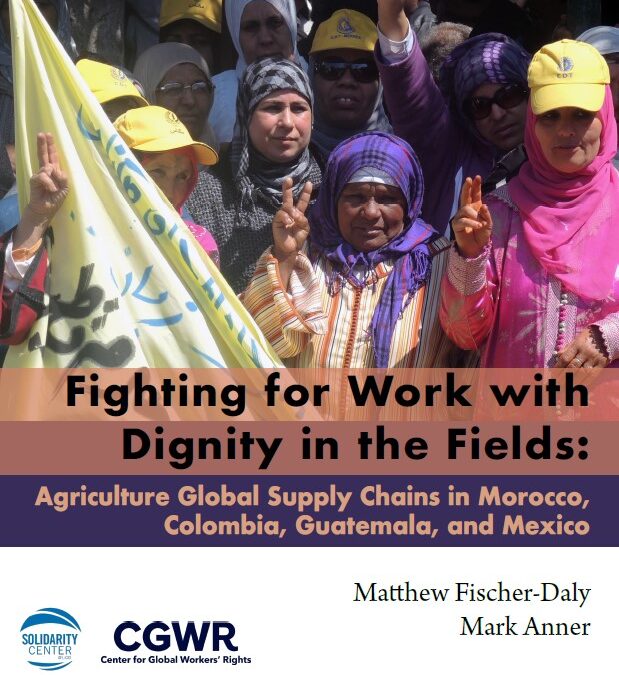
Nov 12, 2021
Победа в борьбе за гендерное равенство и равенство в оплате труда в бывшей советской республике Казахстан: в прошлом месяце эта страна отменила список рабочих мест, юридически недоступных для женщин с 1932 года. Такие дискриминационные списки, которые вынуждают женщин отказываться от более высокооплачиваемой работы в традиционно мужских секторах в пользу низкооплачиваемых профессий, в которых доминируют женщины, – типичны для данного региона, а также для Беларуси, Кыргызстана, России и Узбекистана.
Отмена данного списка в Казахстане стала возможной в результате многолетних усилий адвокации партнера Центра Солидарности – Казахстанского Международного Бюро по правам человека (КМБПЧ) на встречах, конференциях и других форумах с политиками и представителями правительства, включая Министерство труда и социальной защиты Республики Казахстан и Комиссию по правам человека при Президенте Республики Казахстан.
“В современном мире не должно быть дискриминационных ограничений на доступ к работе, и все люди сами имеют право выбирать, где и как работать”, – сказал заместитель директора КМБПЧ Денис Дживага.
Работа, в которой ранее женщинам было отказано, включала относительно хорошо оплачиваемые рабочие места в строительстве, металлообработке, горнодобывающей промышленности и нефтедобыче, в том числе: работы, выполняемые на высоте или под землей; квалифицированные строительные, дорожные и металлообрабатывающие работы, включая кладку, работу на землеройной технике, плавку руды, установку труб и сварку; а также специализированные работы в разведке и геодезии, такие как бурение скважин, установка вышек и прессование труб.
Международная организация труда (МОТ) уже давно призывает государства отменить списки профессий, запрещенных для женщин, учитывая их дискриминационное воздействие. Женщины в Казахстане, например, зарабатывают в среднем на 32 процента меньше, чем мужчины.
Список Казахстана, который ограничивал доступ женщин к более чем 200 профессиям на том основании, что работа была слишком тяжелой или опасной с физической точки зрения, был отменен после того, как правительство Казахстана признало в Комитете ООН по ликвидации дискриминации в отношении женщин (КЛДЖ), что запреты на работу способствовали неравенству в оплате труда мужчин и женщин. Комитет ООН по экономическим, социальным и культурным правам (CESR) рекомендовал Казахстану рассмотреть другие формы правовой защиты женщин, чтобы обеспечить их безопасность на работе, а не осуществлять полный запрет на доступ к определенным профессиям.
“Гендерное равенство и равенство в оплате труда требуют, чтобы мужчины и женщины имели равный доступ ко всем видам работы и чтобы все рабочие места были безопасными для всех работников”, – подчеркнул директор региональной программы Центра солидарности в Европе и Центральной Азии Руди Портер.

Nov 12, 2021
In a win for gender and pay equity in the former Soviet region of Kazakhstan, last month the country abolished a list of jobs from which women have been legally barred since 1932. Such discriminatory lists—which force women away from higher-paid work in traditionally male-dominated sectors toward lower-paid, female-dominated occupations—are common in the region, including in Belarus, Kyrgyzstan, Russia and Uzbekistan.
Abolition of Kazakhstan’s list came about after years of advocacy efforts by Solidarity Center partner Kazakhstan International Bureau for Human Rights (KIBHR) in meetings, conferences and other fora with policy makers and government representatives, including the Ministry of Labor and Social Protection of the Republic of Kazakhstan, and the Commission on Human Rights under the President of the Republic of Kazakhstan.
“In the modern world there should not be discriminatory restrictions on access to work and all people themselves have the right to choose where and how to work,” said KIBHR Deputy Director Denis Jivaga.
Among the jobs previously denied to women were relatively well-paid jobs in construction, metalwork, mining and oil extraction sectors including: jobs performed at-height or underground; skilled construction, road and metal-working jobs including masonry, ground-moving machine operation, ore smelting, pipe fitting and welding; and specialized work in exploration and surveying such as borehole drilling, derrick installation and pipe pressing.
The International Labor Organization (ILO) has long called on states to abolish lists of professions prohibited for women given their discriminatory impact. Women in Kazakhstan, for example, earn 32 percent less than men on average.
Kazakhstan’s list—which restricted women from more than 200 jobs on the grounds that the work was too physically demanding or dangerous—was abolished after the Kazakhstan government acknowledged to the UN Committee on the Elimination of Discrimination Against Women (CEDAW) that job prohibitions have contributed to gender-pay inequity. The UN Committee on Economic, Social and Cultural Rights (CESR) recommended that Kazakhstan consider other forms of legal protection for women to keep them safe at work rather than a total ban on access to certain professions.
“Gender and pay equity require that men and women have equal access to all types of work, and that all jobs be made safe for all workers,” says Solidarity Center Europe and Central Asia Regional Program Director Rudy Porter.
Read in Russian.

Oct 28, 2021
Last week, 125 women improved their wages and working conditions through a new negotiated agreement with an Albanian subsidiary of an Italian multinational lighting company. The agreement, which ended a 15-day work stoppage, was supported by Solidarity Center Albania union partners Bashkimi i Sindikatave te Pavarura te Shqiperise (BSPSH) and Sindikata e Pavarur e Minatoreve te Shqiperise (SPMSH).
“An extraordinary example, these 125 women; an example to be followed by all!” said SPMSH-Albania President Gezim Kalaja, who partially credited the win to support from Confederazione Italiana Sindacati Lavoratori (CISL), European Trade Union Confederation (ETUC), International Trade Union Confederation (ITUC), IndustriALL Europe, IndustriALL Global Union, Pan European Regional Council (PERC), PERC’s Women’s Committee and the Solidarity Center.
The agreement won substantial wage increases—7 percent during year one, 11 percent during year two and 17 percent during year three—and sidelined an employer-proposed reduction in the number of shifts available for workers.
Iliria-Electric Albania produces plastic components for lighting sold on the European market by Arditi Italy.
The win underscores the company’s course correction toward respect for fundamental labor rights, including the right to collective agreements and freedom of association in Albania, said IndustriALL Europe General Secretary Luc Triangle.

Oct 22, 2021
Climate justice activists are increasingly under attack across the globe by governments acting in concert with private interests, a trend that threatens civic freedoms for all, says the United Nation’s special rapporteur on the rights to freedom of peaceful assembly and association in a new report.

UN Special Rapporteur on the rights to freedom of assembly and of association Clément N. Voule
UN Special Rapporteur Clément N. Voule delivered the report to the UN General Assembly last week and then discussed its findings at a virtual side event October 15. At the event, Voule outlined the escalating threats to climate activists and their organizations, including criminalization of peaceful protests—the foundation of grassroots human rights advocacy campaigns. Of special concern, he said, are the use of state agencies and legislatures by private interests to impede or eliminate environmental defenders through physical attacks, intimidation, imprisonment and other judicial harassment, as well as restrictions on funding and travel to international climate justice venues.
More than 70 percent of human rights defenders killed each year are standing up for the environment, he said.
The report found a pattern of escalating threats that are undermining the effectiveness of environmental activists and their organizations worldwide, such as:
- Violence and intimidation
- The use of national security laws to surveil, charge or imprison environmental activists
- An increasing number of bans and restrictions against formerly legal protest methods, such as road blocking
- Ramped-up public smear campaigns that destroy activists’ reputations by painting them as extremists, foreign agents or terrorists
The report cited “powerful actors, including transnational fossil fuel, extractive, agribusiness and financial institutions,” that are pressuring governments to weaken their climate response and which “have supported parastatal organizations engaging in a variety of campaigns against climate justice activists, including online and direct violence.”
However, said Voule at the side event, “We must change the narrative. Environmental activists are not the enemy.”
The side event was led by Voule in cooperation with Earthrights International, European Center for Not-for-Profit Law (ECNL), Geneva Academy, Greenpeace International, International Center for Not-For-Profit Law (ICNL), International Service for Human Rights (ISHR) and the Solidarity Center. The event was moderated by Greenpeace International Legal Counsel Daniel Simon. Presenters included Permanent Mission of Costa Rica to the UN in New York Ambassador Rodrigo Carazo; Permanent Mission of Ireland to the UN in Geneva Ambassador Michael Gaffey; Earthrights International Climate Change Policy Adviser Natalia Gomez; First Nation Couchiching and U.S.-based Giniw Collective Founder Tara Houska; economist and Congress of South African Trade Unions (COSATU) Labor Market Policy Coordinator Lebogang Mulaisi and Secretary General’s Envoy on Youth Jayathma Wickramanayake.

COSATU Labor Market Policy Coordinator Lebogang Mulaisi
COSATU is joining the climate justice fight, said panelist Lebogang Mulaisi, because working people—especially those in the informal sector unfairly unprotected by labor laws and excluded from social safety nets—are the group most impacted by climate change. Unions are natural allies of defenders of community environmental rights because workers are from communities, she said.
“Climate justice is for everyone, and climate justice is now,” she said.
Unions will ally with the environmental justice movement to defend everyone’s rights, Mulaisi added, because they can only fight effectively for decent jobs while retaining the right to legally mobilize “mass social power” when negotiations at the conference table fail.
All states must ensure that all workers are guaranteed the right to associate, including the right to strike, and to bargain collectively at all levels, including over matters related to climate change and just transitions, recommends the report.
Unions Are Integral to the Climate Justice Movement
The report finds that unions are integral to states’ efforts to meet the objectives of the legally-binding Paris Agreement, which calls for states to “respect, promote and consider their respective obligations on human rights” and rights of indigenous peoples, as well as to take into account “the imperatives of a just transition of the workforce and the creation of decent work and quality jobs in accordance with nationally defined development priorities.”
Unions are helping states achieve these objectives by:
- Advocating for a just-transition agenda, which is a worker-led framework demanding a fair and democratic approach from governments that are shifting their economies to sustainable production—including application of a range of social interventions that are needed to secure worker rights and livelihoods
- Advancing a climate justice agenda and influencing employers at workplace, sectoral, national and international levels to transition to clean energy and address environmental degradation.
The effectiveness of workers and unions to drive inclusive climate solutions is being hampered by issues that must be addressed and resolved, including:
- Regular exclusion of unions and workers from critical climate discussions and policy design and planning, such as those associated with nationally determined contributions (NDCs) and job-loss mitigation projects developed under the Paris Agreement
- Through the exclusion of large swaths of workers from labor laws, barriers to those workers’ right to exercise freedom of association and peaceful assembly—with migrant workers and those employed in agricultural or informal sectors, or by foreign investors, being especially vulnerable.
Governments and employers must engage with workers and their organizations to develop climate and just transition policies, says the report because “[a]ddressing the climate crisis and ensuring a just transition require the existence of a vibrant and dynamic civil society.”

Oct 4, 2021
Where unions establish collective bargaining, they initiate the strongest mechanism for protecting agricultural workers’ rights, health and dignity according to a new report prepared for the Solidarity Center by researchers at Penn State’s Center for Global Workers’ Rights (CGWR).
“Fighting for Work with Dignity in the Fields: Agriculture Global Supply Chains in Morocco, Colombia, Guatemala, and Mexico,” seeks to understand employment relations in agricultural global supply chains and the struggle for dignity and empowerment of workers who are providing the world’s food. The report analyzes five agribusiness sectors including palm oil in Colombia, bananas in Guatemala, strawberries in Mexico, and grapes, olives and wine in Morocco.
In all four countries and five sectors, workers’ collective action has been “almost entirely responsible for increasing respect for workers’ rights” in a context where: 1) governments are constraining worker rights in favor of maximum employer flexibility in support of national, export-oriented development policies and, 2) global retailers are putting downward pressure on wages by curtailing the amount of capital that production workers might negotiate over with their employer for wage increases.
Researchers found that—where established—unions are performing the task of government to protect workers’ legal rights, increasing stability in otherwise precarious employment sectors and providing a mechanism for women to advance gender equality in job status and earnings as well as address rampant gender-based violence associated with their jobs—including transportation to and from the workplace. For example:
- In Colombia, unions negotiated agreements that increased direct hiring by three palm oil production companies, pushing back against the sector’s rampant use of labor subcontracting, which denies subcontracted workers union representation and provides them lower pay and more precarious work.
- In Guatemala, union representation in the banana sector means employer compliance with laws on working hours, remuneration, provision of personal protective equipment, voluntary overtime, protection from sexual abuse and freedom of association.
- In Mexico, while not achieving collective bargaining, the 2015 strike during strawberry harvest compelled employers to increase wages and registration workers in the national social security system, e.g., toward compliance with laws requiring living wages and consistent registration.
- In Morocco, the country’s labor law is enforced in grape, wine and olive oil production due to the agreement secured for workers by the Confédération Démocratique du Travail (CDT).
Addressing inequality and gender-based violence and harassment
Women, who comprise between 50 percent and 70 percent of the informal workforce in commercial agriculture, are especially vulnerable to sexual harassment, physical abuse and other forms of gender-based violence at work. Unions are addressing the gender-based violence that is common in all five sectors studied, as well as gendered pay discrimination and division of jobs that reduces women workers’ earnings, as follows:
- In Guatemala’s banana sector, women workers covered by union contracts report 50 percent less incidence of sexual harassment than peers at nonunion plantations because union women “can inform the company,” a female unionist explained.
- Women in Mexico’s strawberry sector reported that the 2015 strike helped reduce sexual abuse at work.
- While Moroccan law does not prescribe comprehensive equitable treatment, women’s participation in CDT negotiations with Zniber-Diana resulted in clauses requiring equity.
Although union density remains extremely low in all sectors studied, the report concludes that, “[w]here workers are able to unionize and collectively bargain, conditions improve, wages increase and gender-based violence is curtailed,” and that increased union density and collective bargaining coverage will expand these improvements.






